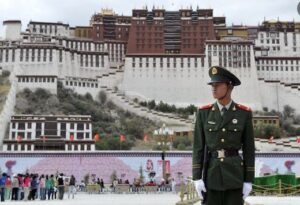 The 2021 Report from the United States State Department on Human Rights Practices, focusing on China, reports significant human rights abuses faced by Tibetans living in Tibet under Chinese rule including torture, arbitrary arrest and detention, political prisoners, unlawful interference with privacy, restrictions on internet freedom, interference with the right to peaceful assembly and severe restrictions on practising religion and noted harsh prison conditions.
The 2021 Report from the United States State Department on Human Rights Practices, focusing on China, reports significant human rights abuses faced by Tibetans living in Tibet under Chinese rule including torture, arbitrary arrest and detention, political prisoners, unlawful interference with privacy, restrictions on internet freedom, interference with the right to peaceful assembly and severe restrictions on practising religion and noted harsh prison conditions.
Under arbitrary deprivation of life and other unlawful or politically motivated killings, of the many incidents, one example cited was the fate of Tenzin Nyima, a Buddhist monk who died in December 2020 or early January 2021 after suffering severe beatings over the course of many monthswhich left him in a coma; he died severely malnourished and paralysed.
In the case of disappearances, the whereabouts of many Tibetans detained by security officials areunknown. The whereabouts of the 11th Panchen Lama, Gedhun Choekyi Nyima, the second most renowned spiritual figure in Tibet after the Dalai Lama remains unknown since his forceful disappearance in 1995, said the US State Department’s report.
The report further explained the poor and unlawful arrest procedures and treatment of detainees in Tibet. When Tibetans and others are arrested for political reasons, law and regulations are not followed and “incommunicado detention” was reported as a common practice.
Under the cases of arbitrary or unlawful interference with privacy, family, home or correspondence, the report mentioned that the Chinese authorities “electronically and manually monitored private correspondence and searched, without warrant, private homes and businesses for photographs of the Dalai Lama and other forbidden items,” including “reactionary music” from India through extreme surveillance systems such as “facial recognition” and “smart identity cards”.
Tibetans who have family members living in India and other countries are subject to government harassment and investigation. It is also reported that when these Tibetans return from visiting families overseas, they are required to spend several weeks in political education classes.
It is reported that there is no internet freedom in Tibet. The reported quoted Tibet Autonomous Region (TAR) Party Secretary urging the authorities to “resolutely control the internet, strengthen online propaganda, maintain the correct cybersecurity view, and make the masses listen to and follow the Party.”
Though China’s law provides for freedom of internal movement, foreign travel, emigration, and repatriation, the government severely restricts travel and freedom of movement for Tibetans, particularly Tibetan Buddhist monks and nuns as well as lay persons whom the government considered to have “poor political records,” continued the report. For Tibetans, acquiring a passport itself is almost impossible for most of them, and the process required to be followed for travelling outside is another hurdle.
The report also mentioned the monasteries’ requirement to involve Chinese officials in their administration and to oversee their education and other programmes.
A section on children said that boarding schools and other People’s Republic of China’s sinicisation efforts are “part of a deliberate effort by the state to eliminate the core of Tibetan identity and replace it with a hollowed-out version compatible with the Party’s aims.”
You can read the full report here




 Print
Print Email
Email